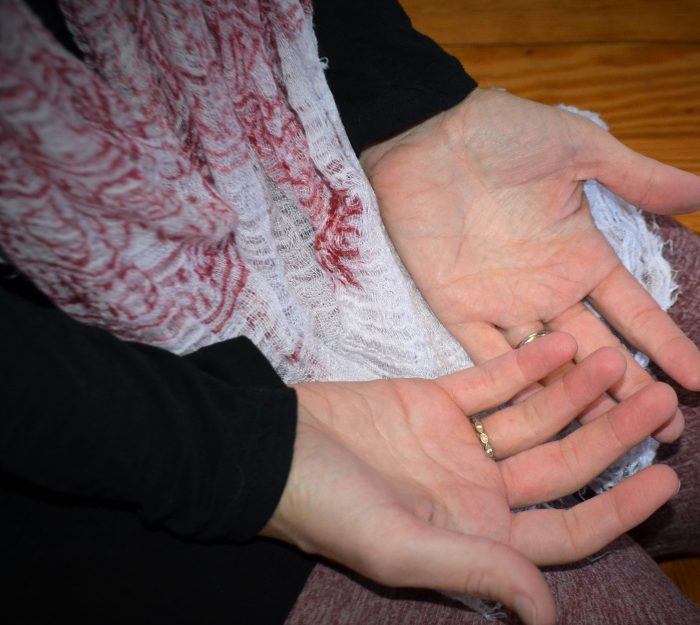Mindfulness has become a trendy form of stress-relief, ubiquitous now in hospitals, corporate settings, professional sports teams, and beyond. It can be truly helpful on this level. We practice it to help us handle the pressures of daily life with greater skill and ease.
On a deeper level, mindfulness is a tool of transformative change. The kind of change that can occur within a practitioner or a community of mindfulness practitioners is systemic. Through my own experience and that of many I know, I’ve found that a committed mindfulness and meditation practice has the potential to alter the foundation of one’s life.
Let’s imagine this as the foundation of a building – the concrete walls of a basement upon which the structures of our lives are built. We have very little control over how these walls are constructed when we are young. We automatically and hungrily take in all that is around us – the perceptions and ideologies of our families, institutions, and broader culture. Upon this foundation of conditioning, we develop “our own” perceptions and ideologies. We think we know who we are and what we want. We think we exist separately from everything else, individual bodies with unique experiences. We build our lives based upon these flawed understandings. A first floor, perhaps a second, is added to the foundation. We think it is stable.
For many of us, there are minor or major earthquakes along the way. Violence, loss, and other forms of trauma shake us to the core. We realize how unstable the structure of our lives really is. Tiny fractures begin to creep along the concrete walls we imagined impenetrable.
We seek tools to help us cope. We use love, sex, dogma, and drugs to “get through it all.” But get through to where? To some magical other-reality beyond this one that so dramatically juxtaposes beauty and suffering?
I came to the practice of mindfulness after just such a juxtaposition – the expectancy of our first baby and then the death of her body within my own. I know that countless others have experienced this same human loss. Many more have experienced far more violent and chronic losses due to poverty, racism, and the many other forms of exploitation.
And yet, the loss was deeply painful. In the depths of my own personal trauma and depression, mindfulness did not offer me a way out of the pain. It wasn’t a coping tool in the same way that medication or alcohol had once been. It was a tool for seeing more deeply, for taking a flashlight down into the basement, for exploring the foundation and taking note of the cracks.
Among those cracks were the beliefs that I could plan anything and expect a certain outcome; that I was unique in my own personal brand of suffering; that life actually was the way that I perceived it.
And this is what I mean when I say that mindfulness has the potential to alter the foundation of one’s life. It is a practice of looking that helps us to see the many cracks, to reach through those cracks, and to feel the cold clay on the other side. We are more fundamental than we thought we were. We are the clay itself that holds the concrete as it cracks and buckles. We are the ancient forces that shaped the clay, the pressure that hardened it and the rain that softened it. We are the grass and trees growing atop it. We are inseparable from everything else. And we are as vulnerable as anything else.
The direct knowing of this may not change our outward lives in dramatic ways. In fact, as I’ve become more and more familiar with my own foundational cracks, my life looks fairly unchanged. I live in the same home, read the same books to my children, maintain habits and preferences, clean dishes and fold laundry. But mindfulness has transformed how I relate to myself and thus how I relate to every other experience in my life.
What then is the effect of this on the outer world?
In the same way that mindfulness reveals cracks in our personal foundations toward a deeper truth, it empowers us to uncover the deep cracks in our collective foundation: the stories we’ve been told about our country’s history; the values that have been ascribed to us based on our social identities; the roles we’ve been told to play to keep wealth and power concentrated in the hands of an elite few; and much, much more.
Mindfulness alone cannot teach me all of these things, but it gives me the curiosity, the openness, the courage, and the strength to seek out these truths that have long lurked at the edge of my consciousness. Our society gives us every reason not to look past our collective stories. It explains away the killing, abuse, and mass incarceration of Black and Brown humans through racist ideology. It glosses over genocide of the indigenous and pretends to honor Native Americans through cultural appropriation. It tells girls that “they can be anything” and then exonerates sexual harassment and pays a woman 20% less than a man in the same job.
In terms of social identity, I am a woman who has been taught that she is white. Whiteness is number one on the long list of social identities I continue to confront and explore. Challenging white supremacy in a country founded on this very principle requires me to go deep into the foundation and find that malignant crack that racializes us and then turns us against each other as well as our own humanity. Gender is the second on my list. Understanding myself outside of the limitations of a proscribed “womanhood” within a patriarchal system takes intense and consistent effort. Without mindfulness as my primary tool – without a daily mindfulness meditation practice – I do not know if I would be engaged in this struggle. In fact, in full transparency, for years I watched myself use my relative privilege to avoid facing these issues.
Mindfulness is a powerful tool, and like any other powerful tool, how we choose to use it matters. Because mindfulness helps to strengthen self-awareness, attention, and regulation, it can be used as a tool to enhance any number of human endeavors. In our society, we see it being used as a means to various ends, from enhancing military performance to maximizing corporate productivity.
At the same time, mindfulness is emerging as a tool for change-makers of every sort – therapists, artists, healers, educators, organizers, activists, and others. We are using mindfulness to heal ourselves from the inside out and to powerfully facilitate justice with and for one another. The foundation crumbles, and we are still standing.









Read 3 comments and reply